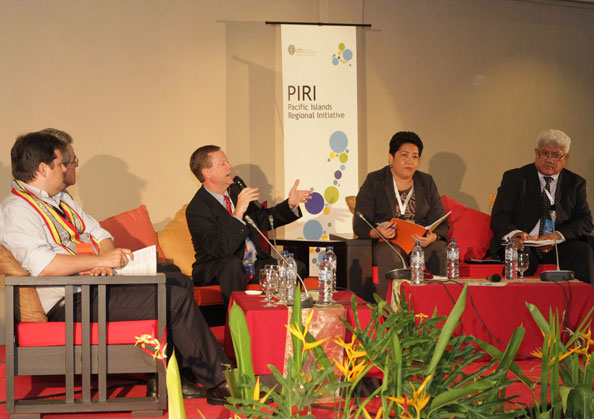22 May 2015
The importance of money transfer operators and the issue of de-risking in the Pacific Islands

Dr. Sione Ngongo Kioa, Governor at the National Reserve Bank of Tonga (far right), and Ms. Maiava Atalina Emma Ainuu-Enari, Governor at the Central Bank of Samoa (second from right), discuss the issue of de-risking and MTOs with John Owens, senior policy advisor at AFI (middle), and Robert Bell, founder at KlickEx (far left), at the launch of the Pacific Islands Regional Initiative in Dili, Timor-Leste.
The issue of de-risking and the related impact on remittances has arisen recently at a series of high-level conferences and forums across the Alliance for Financial Inclusion (AFI) Network. During the G24-AFI Policymakers’ Roundtable in Washington, DC, there was a clear reference to the threat to financial inclusion posed by de-risking strategies of international banks, especially in countries where remittances form an essential part of financial safety net. The G20 Global Partnership for Financial Inclusion has committed to lowering the costs of remittances “harnessing emerging mechanisms such as electronic payments and mobile technology” to an average cost of 5 percent or lower. These issues was again raised during the recently concluded Pacific Island Regional Initiative (PIRI) meeting held in Dili, Timor-Leste, where the issue and concerns of de-risking were highlighted by the Dili Consensus.
During the meeting, I had the honor of moderating a panel session, which included representatives from the private sector and academia as well as Ms. Maiava Atalina Emma Ainuu-Enari, Governor at the Central Bank of Samoa (CBS), and Dr. Sione Ngongo Kioa, Governor at the National Reserve Bank of Tonga (NRBT)—two countries heavily reliant on remittances. During the session, we discussed and shared some of the excellent remittance price tracking resources available online, such as the World Bank’s Remittance Prices Worldwide and regional sites such as Send Money Pacific. Properly updated and comparable remittance price websites provide important resources for policymakers and regulators to take advantage of as they monitor the real costs of remittances. Those countries that are heavily reliant on remittances can take advantage of this information to provide their own updates on central bank websites and/or via their quarterly returns to the public in order to encourage greater transparency and help monitor the impact of de-risking as well as ensure greater competition among remittance providers in their countries. In addition, we discussed the importance that combining mobile access to information on-the-go will have for the public, especially with the expected launch of the World Bank’s Pick Remit application (see Pick Remit Presentation).
Our main private sector presenter for the session on remittances during the PIRI meeting was Robert Bell, the founder of the MTO KlickEx, who shared the issue and background behind the de-risking issues international banks are facing.
The case of KlickEx is unique in that they not only operate as an MTO but also more importantly act as their own switch, which is open to all MTOs at no cost. Providing a platform with high levels of AML/CFT monitoring and compliance for all MTOs making use of their system. The cost of remittances in countries such as Tonga, for example, have clearly benefited from the efforts of MTOs such as KlickEx and their unique platform. From the Send Money Pacific website, it is clear the average costs for remittances via banks as well as larger traditional remittance providers would make Tonga one of the more expensive markets in the world with banks averaging 16.82 percent and providers such as Western Union averaging around 13 percent, more than 50 percent greater than the average international remittance cost of eight percent (see footnote 1). However, since the introduction of KlickEx and the others MTOs that are utilizing the KlickEx platform, remittance costs for these providers average 4.6 percent and are as low as 1.06 percent from New Zealand to Tonga for amounts of NZ$200.
Due to the lower cost fees associated with sending remittances via MTOs, countries have been able to reduce the costs of remittances as well as dramatically reduced the risk of anti-money laundering. Not only can MTOs offer high levels of AML/CFT monitoring capability and reduced costs, but also these reduced costs can lower the average size of remittances. Whereas before, people sent an average of NZ$200-300 per month to Tonga, they were now sending amounts as low as NZ$50-75 three to four times a month. The lower amounts being sent due to the reduction in fees even further reduces the potential for money laundering.
Forums like PIRI have helped highlight the importance of improved monitoring and sharing by policymakers and regulators on the cost of remittances, the vital role and importance of MTOs and the importance to try and address de-risking issues, notably in countries reliant on remittances.
Afterword: During the session on remittances and while comparing statistics on the World Bank website, we learned the remittance corridor between Australia and Vanuatu is now one of the most expensive in the world averaging 20.61 percent. At the end of the session KlickEx mentioned they were in the process of applying for an application to provide remittance services to Vanuatu and as result of forum has now agreed to fast track this process. As a concrete example of the role that public-private sector dialogues like the one held during the PIRI meeting, we look forward to tracking the progress and impact that MTOs can play in not only lowering the costs of remittances but also in effectively reducing the risk of AML/CFT through improved compliance monitoring and lower average but greater volumes of remittances.
[1] SendPacific.org link for the costs of remittances between NZ and Tonga for remittances of NZ$200.
ABOUT THE AUTHOR
John Owens is the Senior Policy Advisor Digital Financial Services & FI Policies at the Alliance for Financial Inclusion.
© Alliance for Financial Inclusion 2009-2024